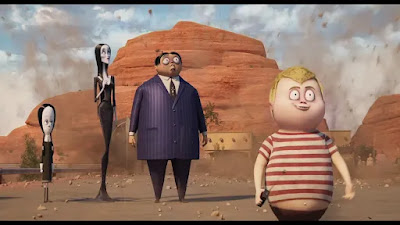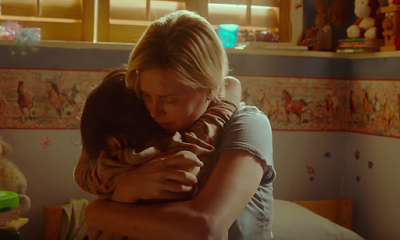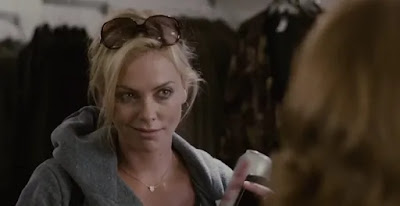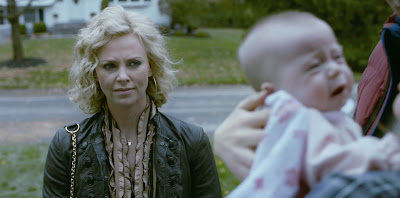or
I've made plain my life-long love of "The Addams Family" especially the TV-series based on the macabre New Yorker cartoons of Charles Addams (not the worst source for a TV show...), which, for its short two year run, did a running black satire of family sitcoms—credit to Nat Perrin, who'd worked with the Marx Brothers and who knew "funny."
Attempts to revive the characters have been monstrously uneven whether in film, TV revivals or cartoon series. The best result was Barry Sonenfeld's film Addams Family Values, which managed to combine satire—and not sitcom-satire, real satire—and clever writing to make a wicked little movie on many levels.
The same could not be said for 2019's The Addams Family, a CGI-animation version that knew exactly what it was supposed to do...but couldn't make it funny. With that title, you could immediately guess that cleverness was not going to be the spark that animated the thing to life.
Well, now everybody's back with...The Addams Family 2. Its biggest joke might be the "Submitted for Your Consideration" ad come Oscar-time.
Oh, technically, it's all fine. CGI being what it is these days, something (like, say, a waterfall) has to be really dodgy for it to be noticed. It's just that there is a sense of rote-ness to this, a feeling that the ambitions are so slim, the characters so known, that any effort besides the obvious isn't attempted, and in fact is avoided, lest it fall out of a PG category and betray the lack of sophistication expected in animated films. There's no shock, no envelope-pushing, and no sense of the black humor emblematic of the original Addams work in The New Yorker.
This one, like the last, focuses on Wednesday Addams (Chloë Grace Moretz), who is going through all sorts of growing pains. For her school's science project, she's developed a way to transfer tendencies from one being to another (ala Freaky Friday (both of them) and God knows how many other films and television shows)—in this case, she transfers her pet octopus' higher brain functions to her sweet but diminished Uncle Fester (Nick Kroll). Fester will, as the film progresses, take on more and more octo-tendencies, which the family doesn't really notice too much (which is odd but not funny). Wednesday's work is noticed by a mad scientist named Cyrus Strange (Bill Hader, surprisingly uneffective) who would like to know her methodology, which she refuses to divulge as "a family secret."
This starts a plot where Strange sets up a plot to convince the Addams Family that Wednesday was switched at birth with another child (as the joke that Addams used for Wednesday was that she resembled her mother this makes little sense and they have to do extra work to get past DNA issues). As Wednesday is already feeling estranged from her family, this sets too well with her, but not the others, and Gomez suggests they go on a family road trip to see the worst of America (planned stops are Salem, Sleepy Hollow, Miami, San Antonio, The Grand Canyon, Death Valley, and...Sausalito). If one did a little more research—or just had the cajones to risk offending people—they could have found a LOT of places to go.
It's not a lot of fun—there were two lines that made me laugh: When the family sits down to dinner, Fester starts to dig in and Morticia chastises him: "Fester, wait for the children..." to which he replies "I thought we were having CHICKEN!" And at a detour to Niagara Falls, Morticia asks Wednesday "Having fun, dear?" To which she replies "I'm looking at Canada, if that answers your question..." (just the phrasing of that I liked). There's also a nice shot of Gomez being so depressed, he can't even cradle his head on his hands. "Thing" has to do it. It's at the bottom of the review, as it graphically encapsulates how I feel about the film.
The cast does a good job for all they're asked to do: Oscar Isaac is the proper amount of latin dash as Gomez, but Charlize Theron seems to be under the impression that Morticia went to Bryn Mawr. Chloë Grace Moretz has the largest role as Wednesday, but doesn't do much to sell the humor of her depressed daughter, and Nick Kroll does a fine imitation of Jackie Coogan's TV Uncle Fester, but with considerably more saliva. And why the producers thought the sonorous butler Lurch would, when he sings (!!!), have a high singing voice I have no idea, but they do it. He sings "I Will Survive" which isn't funny and makes little sense story-wise.
But, then, that passes for the best you can expect from this milquetoast Addams Family series, which is the wrong format for the wrong audience and betrays and negates the peculiar charms of Addams' original work. It should be staked, coffined, chained, and buried 12 feet deep in salted, sanctified Earth never to materialize in this incarnation again.





















































